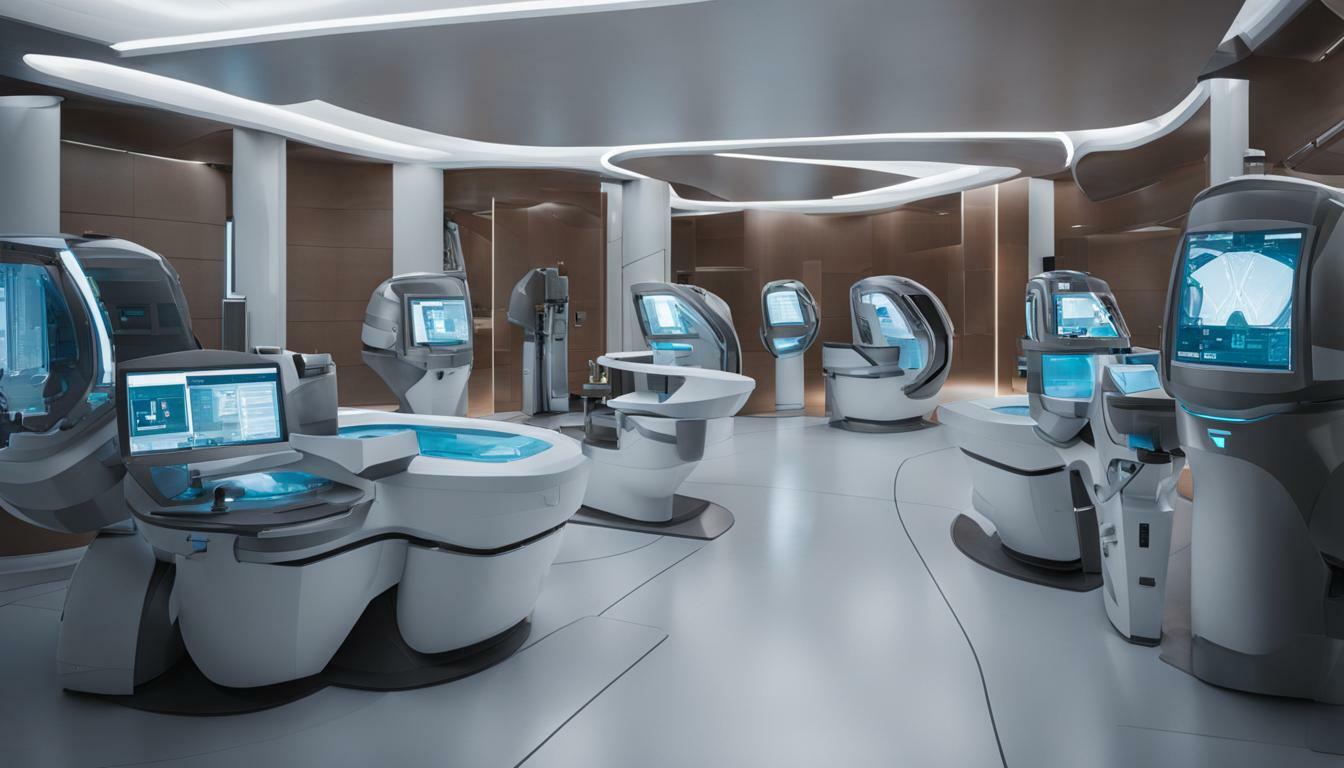
Artificial intelligence (AI) has the potential to revolutionize emergency medicine by improving patient care and outcomes in various aspects of healthcare. From disease diagnosis to treatment selection and clinical laboratory testing, AI technology is transforming the way we deliver emergency healthcare.
AI in healthcare brings a multitude of benefits. By leveraging large datasets and powerful algorithms, AI tools can surpass human performance in identifying patterns and making accurate diagnoses. This not only saves time but also improves the accuracy of disease diagnosis and treatment selection, leading to better patient outcomes.
- AI in emergency medicine has the potential to greatly improve patient care and outcomes.
- AI can be utilized in various aspects of healthcare, such as disease diagnosis and treatment selection.
- AI tools can leverage large datasets and identify patterns that surpass human performance.
- AI technology in emergency medicine can revolutionize personalized medicine and enhance population health management.
- Challenges related to data privacy, bias, and human expertise must be addressed for the responsible implementation of AI in healthcare.
Leveraging AI for Disease Diagnosis and Treatment Selection
AI technology in emergency medicine enables more accurate disease diagnosis and treatment selection by leveraging large datasets and identifying patterns beyond human capability. These AI applications are revolutionizing healthcare, improving patient outcomes, and saving lives. The use of AI in emergency medicine is particularly crucial when time is of the essence, as it can provide rapid and accurate assessments to guide medical interventions.
By analyzing vast amounts of medical data, AI algorithms can detect subtle patterns and indicators that may go unnoticed by human healthcare professionals. This allows for earlier and more precise diagnoses, leading to more effective treatment plans. AI-powered systems can analyze a patient’s symptoms, medical history, and test results, providing doctors with evidence-based recommendations for the most appropriate course of action.
Furthermore, AI advancements in emergency healthcare are not limited to disease diagnosis alone. They also extend to optimizing treatment selection. AI algorithms can analyze extensive databases of treatment outcomes for different medical conditions, allowing healthcare providers to make data-driven decisions regarding the most effective treatment options for individual patients. This empowers doctors with valuable insights and enables personalized medicine on a scale never seen before.
Leveraging AI for Disease Diagnosis and Treatment Selection
AI-driven technologies have the potential to transform emergency medicine by enhancing the accuracy and efficiency of disease diagnosis and treatment selection. These advancements can lead to improved patient care, reduced costs, and ultimately, better health outcomes for individuals and populations alike.
| Benefits of AI in Disease Diagnosis and Treatment Selection |
|---|
| 1. Improved accuracy in diagnosing diseases |
| 2. Enhanced selection of treatment options |
| 3. Rapid analysis of patient data for timely interventions |
| 4. Personalized medicine based on individual patient characteristics |
| 5. Optimization of medication dosages |
In conclusion, the application of AI technology in emergency medicine has the potential to greatly benefit patients by improving disease diagnosis and treatment selection. By leveraging large datasets and analyzing patterns beyond human capability, AI advancements enable more accurate assessments and evidence-based recommendations. This can lead to better patient outcomes, personalized medicine, and optimized treatment options. However, careful consideration must be given to ethical implementation, data privacy, and the need for human expertise to ensure the responsible and effective use of AI in emergency healthcare.

By employing AI algorithms in emergency medicine, clinical laboratory testing becomes more efficient and accurate, leading to faster decision-making and improved patient outcomes. AI-driven solutions have revolutionized the way laboratory tests are conducted, enabling healthcare professionals to obtain critical information with precision and speed.
One key benefit of using AI in clinical laboratory testing is the ability to analyze large volumes of data in a short amount of time. AI algorithms can quickly process and interpret test results, allowing for rapid diagnosis and treatment decisions. This not only saves valuable time but also enhances the efficiency of emergency healthcare delivery.
Moreover, AI technologies can significantly improve the accuracy of laboratory testing. By leveraging machine learning algorithms, AI systems can identify patterns and detect subtle abnormalities that may go unnoticed by human observers. This level of accuracy ensures that patients receive timely and precise diagnoses, leading to more targeted treatments and better overall outcomes.
| Benefits of Using AI in Emergency Medicine: |
|---|
| Efficient processing of laboratory test results |
| Rapid diagnosis and treatment decisions |
| Improved accuracy in detecting abnormalities |
| Enhanced patient outcomes |
In summary, AI-driven emergency medicine has the potential to enhance the efficiency and accuracy of clinical laboratory testing. By leveraging AI algorithms, healthcare professionals can obtain critical information more quickly and accurately, leading to faster decision-making and improved patient outcomes. The use of AI in laboratory testing not only saves time but also improves the accuracy of diagnoses, ensuring that patients receive the right treatment at the right time.
Revolutionizing Personalized Medicine and Population Health Management
The integration of AI in emergency medicine revolutionizes personalized medicine, allowing for tailored treatments that lead to better patient outcomes, while also optimizing population health management through data analysis and targeted interventions. AI technologies have the ability to analyze vast amounts of patient data, including medical records, genetic information, and lifestyle factors, to identify patterns and trends that can inform treatment decisions. This data-driven approach enables healthcare professionals to develop personalized treatment plans that take into account individual patient characteristics and preferences.
With AI, medication dosages can be optimized based on factors such as body weight, age, and genetic makeup, increasing the effectiveness of treatment while minimizing the risk of adverse reactions. Additionally, AI can support population health management by analyzing large datasets to identify trends, risk factors, and gaps in healthcare delivery. This information can be used to develop targeted interventions and preventive strategies to improve the overall health of communities.
An example of AI’s impact on emergency healthcare is the use of virtual health assistants. These AI-powered tools can provide patients with personalized health information, answer questions, and even assist in triaging symptoms. Virtual health assistants enable patients to access healthcare advice and support remotely, reducing the strain on emergency departments and improving patient education and engagement.
Furthermore, AI has the potential to support mental health care by analyzing patient data, such as electronic health records and social media posts, to identify signs of mental health disorders and facilitate early intervention. This technology can help healthcare providers detect and treat mental health conditions earlier, leading to improved outcomes for patients.

While the integration of AI in emergency medicine offers numerous benefits, it is crucial to address the ethical implications and potential challenges associated with its implementation. Ensuring data privacy and security is paramount, as AI algorithms rely on sensitive patient information. Additionally, efforts must be made to mitigate bias in AI algorithms to ensure equitable healthcare outcomes for all patients.
In conclusion, AI in emergency medicine has the potential to revolutionize personalized medicine and population health management. Through the analysis of patient data, AI technologies can enable tailored treatments, optimize medication dosages, enhance population health management, provide virtual health assistants, support mental health care, improve patient education, and influence patient-physician trust. However, careful consideration must be given to the ethical implementation of AI, addressing challenges such as data privacy, bias, and the need for human expertise. With the appropriate regulations and guidelines in place, AI can be harnessed as a powerful tool to improve emergency healthcare and patient outcomes.
Overcoming Challenges and Ensuring Ethical Implementation of AI in Emergency Medicine
While the benefits of AI in emergency medicine are substantial, challenges such as data privacy, bias, and the need for human expertise must be addressed to ensure the responsible and effective implementation of AI technology.
Data privacy is a critical concern when utilizing AI in healthcare. As patient information is collected and analyzed by AI algorithms, it is essential to establish robust security measures to protect sensitive data. This includes implementing encryption protocols, access controls, and strict adherence to privacy regulations to safeguard patient confidentiality.
Bias is another challenge that needs careful consideration in the development and implementation of AI in emergency medicine. AI algorithms are trained using large datasets, and if these datasets are biased or not representative of the diverse patient population, it can lead to biased outcomes. To address this, it is crucial to ensure that the training data is comprehensive and inclusive, and regularly monitor and correct for any biases that may arise.
Furthermore, while AI can provide valuable insights and suggestions, it is important to recognize the importance of human expertise in healthcare decision-making. AI should be seen as a tool to augment the skills and knowledge of medical professionals, rather than replace them. This requires ongoing education and training for healthcare providers to effectively utilize AI technology and make informed decisions based on the AI-generated recommendations.
To ensure the safe and ethical use of AI in emergency medicine, a comprehensive nationwide approach for regulation and oversight is needed. This includes establishing acceptable risk levels for research, greater transparency of AI algorithms, and the implementation of policies that outline the appropriate and ethical use of AI in clinical care. By addressing these challenges, we can harness the full potential of AI technology in emergency medicine while protecting patient privacy and ensuring equity in healthcare delivery.
FAQ
Q: What are the benefits of using AI in emergency medicine?
A: AI in emergency medicine has the potential to greatly improve patient care and outcomes. It can revolutionize personalized medicine, optimize medication dosages, enhance population health management, provide virtual health assistants, support mental health care, improve patient education, and influence patient-physician trust.
Q: How can AI be utilized in disease diagnosis and treatment selection in emergency medicine?
A: AI tools are able to leverage large datasets and identify patterns that surpass human performance, leading to increased accuracy in diagnosing diseases and selecting the most effective treatment options.
Q: How does AI enhance efficiency and accuracy in clinical laboratory testing in emergency medicine?
A: AI algorithms can analyze laboratory results with precision and speed, reducing the time it takes to obtain critical information and improving diagnostic accuracy.
Q: How is AI revolutionizing personalized medicine and population health management in emergency medicine?
A: AI technologies enable healthcare professionals to tailor treatments to individual patients, leading to improved outcomes. Additionally, AI can analyze population health data to identify trends and develop targeted interventions for improved overall health management.
Q: What challenges need to be overcome for the ethical implementation of AI in emergency medicine?
A: Challenges related to data privacy, bias, and the need for human expertise must be addressed. Steps can be taken to ensure the safety and equity of AI in emergency medicine, including the development of a comprehensive nationwide approach for regulation and oversight, greater transparency of AI algorithms, and the implementation of policies for appropriate and ethical use of AI in clinical care.



